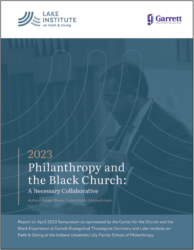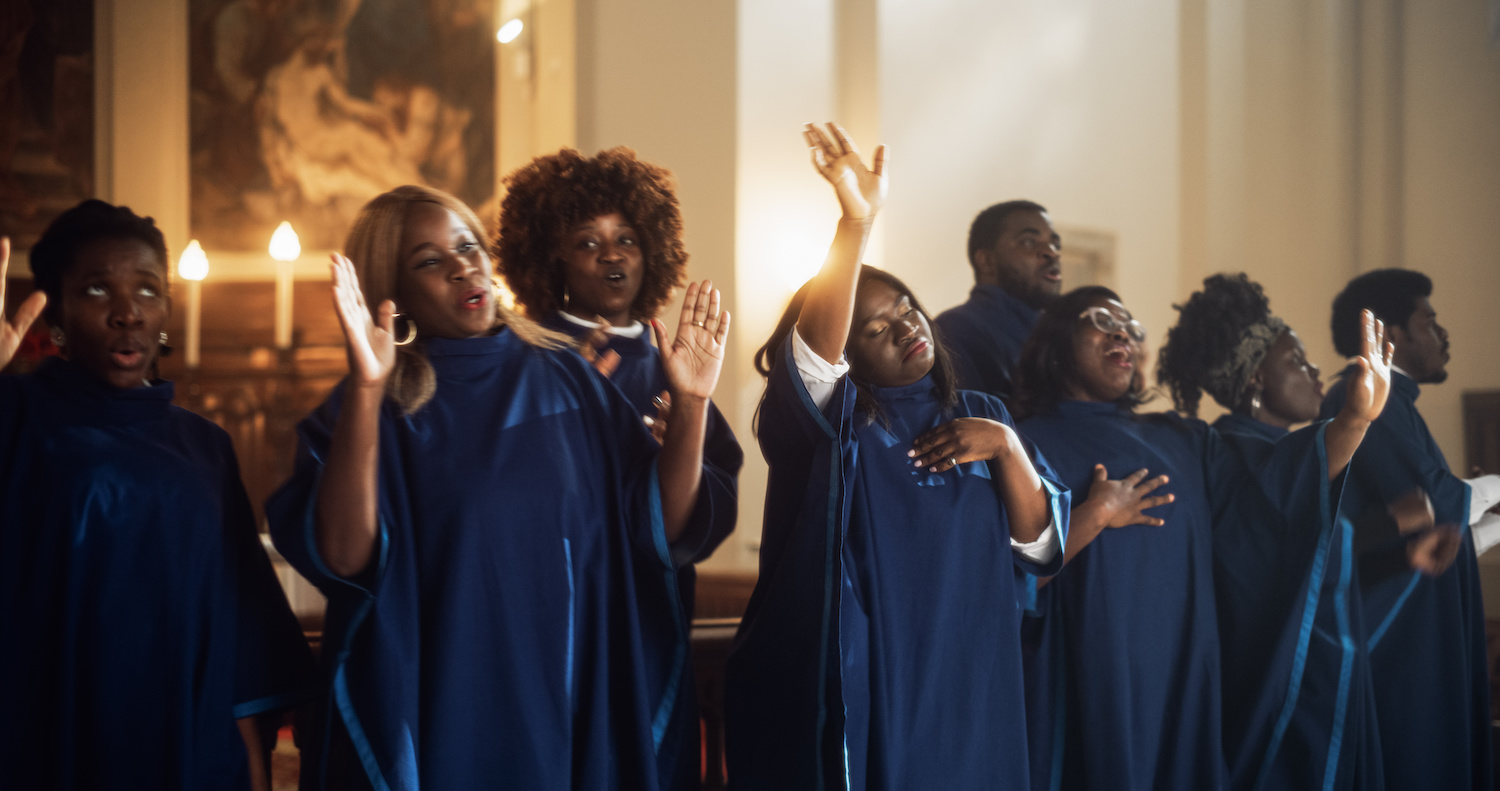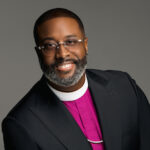Nurturing Generosity in Black Faith Communities: A Perspective
Nurturing Generosity in Black Faith Communities: A Perspective
by Dr. Carlos W. Perkins
On October 5-6, 2023, Lake Institute on Faith & Giving gathered religious leaders from the three historic Black Methodist traditions and several other Black Christian traditions, along with academicians and philanthropic organizations, into a new community of practice, focused on “Nurturing Generosity in Black Faith Communities.”
The first phase of this very special gathering was a conversation with episcopal leaders and general officers from the three historic denominations. The conversation focused on the attitudes, beliefs, experience, and practices of generosity as leaders within their faith communities.
Resonating throughout that initial conversation was an attention to the rich tradition of generosity that has been passed down through generations. Nurturing generosity within Black faith communities is a deeply ingrained practice that reflects the values and principles central to our communities’ beliefs. The episcopal leaders generally agreed that “generosity and/or giving is never about the amount, but always about the attitude.” One of the themes of the conversation is that Black faith communities’ commitment to generosity not only strengthens the bonds within the community but also creates a positive impact on society at large, addressing the unique challenges and opportunities that Black individuals and families face. This history of generosity in many Black faith communities exemplifies the notion that faith and giving are interconnected, serving as a source of inspiration and hope for all.
The following is a reflection from one of the participants at the October gathering.
by Bishop Charley Hames, Jr.
The African American church has long played a central role not only in the spiritual lives of its members but also in uplifting and empowering our communities. One significant aspect of this role is in the practice of giving and philanthropy. Faith leaders have been instrumental in fostering a culture of generosity and advocating for social justice while encouraging the people of faith to leave a legacy of giving through estate planning. In this article, we will explore the trends and challenges within this faith community and discuss how faith leaders can continue to drive transformative change through giving.
Vibrant Giving Culture
The African American church has a vibrant tradition of legacy giving, deeply rooted in faith, resilience, and the pursuit of social justice. Members are encouraged to support their churches’ ongoing community programs by establishing legacy funds in the name of a deceased family member and including the church in their estate planning. This culture of legacy giving not only helps secure the church’s financial stability but also ensures ongoing support for vital community initiatives.
Addressing Financial Literacy Gaps
One challenge faced by those who attended the Lake Institute gathering in October is in addressing financial literacy gaps. Many congregants may not have access to resources or knowledge about effective financial planning and philanthropy. Faith leaders can play a crucial role in conducting workshops and educational programs to enhance financial literacy within the congregation. Equipped with the necessary tools and knowledge, individuals can make more informed decisions regarding their charitable giving and estate planning.
Fostering Transparency and Accountability
It is essential to foster transparency and accountability in fundraising efforts. I would add that your giving increases based on your levels of openness! Faith leaders can implement robust systems for tracking and reporting funds, ensuring that donations are effectively utilized for community programs and initiatives. Transparent communication about the impact of these programs will further encourage congregants to continue their generous support.
Navigating Cultural Barriers to Giving
Cultural barriers can sometimes hinder philanthropic efforts within the African American church community. There may be skepticism or mistrust due to historical injustices or a lack of understanding about the impact of charitable giving. Faith leaders can address these barriers by engaging in open dialogue, sharing success stories, and highlighting the positive societal transformations that result from collective giving. This process can help dispel misconceptions and build confidence in the power of philanthropy.
Leveraging Technology, Partnerships, and Education
The African American church community has significant opportunities to enhance the impact of giving and philanthropy efforts through technology, partnerships, and education. Utilizing online platforms for fundraising and donor engagement can expand reach and make it easier for congregants to contribute. Collaborations with other organizations and institutions, such as universities and foundations, can provide access to additional resources and expertise. Lastly, ongoing education and training for faith leaders can ensure they are well equipped to guide their congregations in effective philanthropic practices.
The practice around giving and philanthropy in the African American church is a testament to the enduring spirit of faith, resilience, and social justice. By addressing financial literacy gaps, fostering transparency and accountability, and navigating cultural barriers, faith leaders can continue to strengthen this community and drive transformative change. Through leveraging technology, partnerships, and education, the African American church can further enhance its impact and bring about positive societal transformation, leaving a lasting legacy of giving and social change.
Bishop Charley Hames, Jr. is the 66th elected and consecrated bishop of the Christian Methodist Episcopal Church. Bishop Hames serves as the presiding prelate of the 9th Episcopal District which includes Oklahoma, New Mexico, Arizona, Nevada, California, Oregon, Washington, and Alaska.
Questions for Reflection
-
- Reflecting on the five trends and challenges in African American faith communities Bishop Hames named above, what similarities do you see in your religious organization?
- What kind of lasting legacy do you hope to see in your own faith community from future generations?
Expanded Perspective: The Mindsets of Abundance and Scarcity
by Bishop Charley Hames, Jr.
I would like to address the elephant in the proverbial room: the mindset around giving in the African American Community.
When it comes to giving and philanthropy, the mindsets of abundance and scarcity play a significant role in shaping our actions and impact. The abundance mindset is characterized by a belief in the inherent ampleness of resources and a willingness to share them freely. On the other hand, the scarcity mindset is driven by fear that resources are limited, leading to a reluctance to give. Historically, I have seen a scarcity mindset more prevalent than an abundance mindset.
An abundance mindset in giving and philanthropy encourages individuals and communities to share their resources without fear or hesitation. It promotes collaboration, partnership, and collective action, as people recognize that working together leads to greater impact and the ability to address systemic issues more effectively. In this mindset, giving is seen as an opportunity for growth and collective well-being, rather than a zero-sum game.
Conversely, the scarcity mindset fosters competition and self-interest. It creates barriers to giving and perpetuates a cycle of inequality, with resources concentrated among a few while others are left in need. This mindset hampers the potential for social change and limits opportunities for uplifting others.
I contend that it is essential to foster an abundance mindset in giving and philanthropy; it is crucial to challenge and overcome the fears and limiting beliefs associated with scarcity. Education and awareness are vital to achieving this shift in perspective. By recognizing that generosity and giving do not deplete resources but instead create a culture of sharing and growth, individuals and communities can embrace abundance and contribute to positive social transformation.
In conclusion, our mindset greatly influences our approach to giving and philanthropy. Cultivating an abundance mindset allows us to tap into our collective potential and create a world where generosity, compassion, and social transformation thrive. This reminds me of Psalm 24:1 – “The earth is the Lord’s, and everything in it, the world, and all who live in it.”
By overcoming the limitations of scarcity thinking, we can unlock the power of giving and make a meaningful impact on the lives of others.
Philanthropy and the Black Church
 In April 2023, 70 leaders in philanthropy and faith convened in Evanston, IL to start a needed conversation about building partnerships between philanthropy and Black religious institutions. Read our report on what happened and discover how you can take steps toward building a “necessary collaborative” between philanthropy and the Black church.
In April 2023, 70 leaders in philanthropy and faith convened in Evanston, IL to start a needed conversation about building partnerships between philanthropy and Black religious institutions. Read our report on what happened and discover how you can take steps toward building a “necessary collaborative” between philanthropy and the Black church.
Who is Simran Jeet Singh?
 – Executive Director of the Religion & Society Program at the Aspen Institute
– Executive Director of the Religion & Society Program at the Aspen Institute
– Author of the national bestseller The Light We Give: How Sikh Wisdom Can Transform Your Life
– Atlantic Fellow for Racial Equity with Columbia University and the Nelson Mandela Foundation
– One of Time Magazine’s sixteen people fighting for a more equal America in 2020
Learn more about Simran Jeet Singh at the 2023 Distinguished Visitor Series on Wednesday, December 6 at 6:00 pm at the Indiana Historical Society.
Subscribe
Insights, a bi-weekly e-newsletter, is a resource for the religious community and fundraisers of faith-based organizations that provides:
- Reflections on important developments in the field of faith and giving
- Recommended books, studies and articles
- Upcoming Lake Institute events


